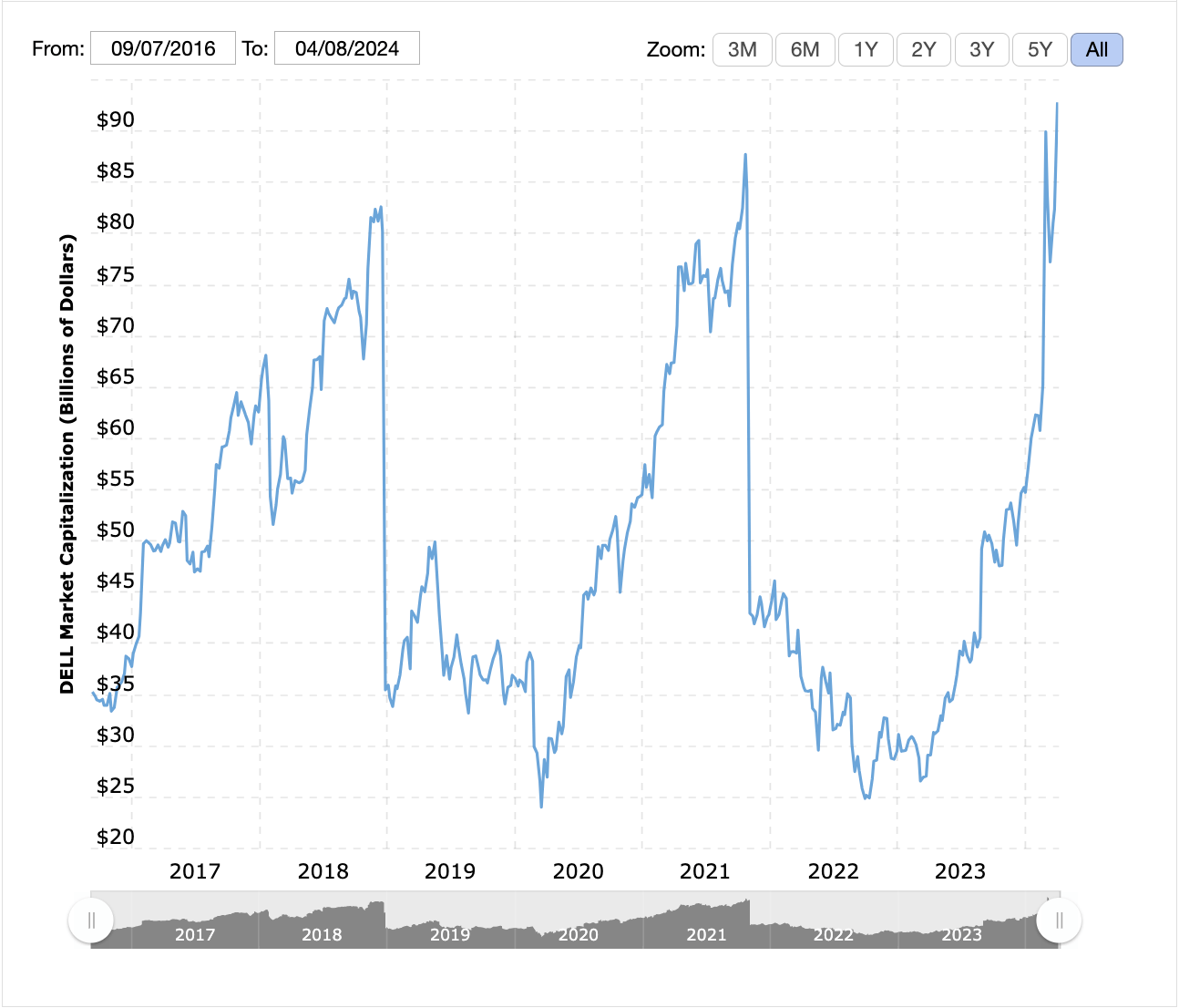Dell’s remote work ultimatum: is it the right decision?
Dell's new policy restricts promotions and internal transfers for remote workers, sparking debate over productivity and workplace flexibility. Here, the Evil HR Lady dives into the controversy and offers insights.

Good news for Dell employees! If they like their remote jobs, they can keep their remote jobs!
They just won’t be considered for any promotions or internal transfers.
While you may be shocked at this, it’s simply Dell saying the quiet part out loud.
We know that CEOs want people in the office. We also know that CEOs want to make profits. Lots of people think that these two things are incompatible, but I’m not convinced by the numbers that insist productivity is higher at home. It certainly is higher for some people – there’s no doubt to that. But it certainly is lower for some people as well.
It’s weird that people assume CEOs are just ignoring reality because they want to control people. It makes much more sense that CEOs see something the rest of us don’t see.
Contents
CEOs like money more than anything
This is probably not entirely true. They probably love their children more than money, and maybe their cats – although I suspect CEOs are dog people. I’d say they love their spouses more than money, but CEOs have higher-than-average divorce rates, and divorced CEOs perform better than never-divorced ones.
But a CEO’s primary goal is to make money for shareholders. It defies logic that all CEOs who want people in the office would reject solid evidence that remote work is more profitable.
Kate Maddison-Greenwell, CEO of People Efficient, imagined the conversation with the CEO of Dell and the head of HR went like this:
If the HR director had legitimate data that these specific remote employees were more productive and the CEO said nope, my word is final, then that is definitely an issue with the CEO, but I doubt things are that clear or simple.
What is productivity?
You can calculate productivity by dividing output by hours (or hours by output, whatever floats your boat). That method is brilliant if you own a widget factory. For a company like Dell, it’s really easy to see how many computers you build, but evaluating the productivity of every employee is a little more complicated.
How do you evaluate the productivity of an HR manager, for example?
A good HR department can prevent sexual harassment, for instance. How do you measure how many sexual harassment complaints didn’t happen because the HR manager was highly productive? Sure, you can compare it to the year before, but that shows a change, not overall productivity. And if this year’s is the same as last, does that mean zero productivity?
It’s easy to count the number of investigations conducted but not the number of investigations that were not needed because of proactive behavior.
We can instead of looking at productivity, look at productivity or market capitalization. Let’s take a look at Dell’s market cap over the past few years.
 The market cap increased after COVID until the huge drop-off when they spun off VMware, but the overall market cap shows more ups and downs consistent with large businesses.
The market cap increased after COVID until the huge drop-off when they spun off VMware, but the overall market cap shows more ups and downs consistent with large businesses.
It certainly doesn’t show that remote work was a disaster. But it doesn’t show how it was an overwhelming success either. There are too many other market forces at play – and Dell has offered hybrid work for a very long time.
Diversity and remote work
Someone at Dell with “access to staff data” said this new requirement to work 39 days in the office per quarter will disproportionately affect women.
I have no doubt that this is true. We know from Dr. Claudia Goldin’s work that women prefer flexibility over money. Women are more likely to want to remain fully remote rather than get more promotions by coming in.
Is this a bad thing? Lots of people think it is, and we should set up our systems to ensure that our employees look like the world around us. I’m not so sure.
If an employee wants to make Dell the center of their life, great! It makes sense that Dell would reward that. If an employee wants to put their family and friends at the center and use Dell to support themselves, then raises and promotions should reflect that as well.
It’s a choice.
The unfair burdens of child and eldercare falling on women are also a choice – a choice heavily influenced by society but a choice nonetheless. When we make those choices, we get those consequences.
Why do CEOs want people in the office?
Last night I hosted an improv jam – where a bunch of us get together and practice our improv comedy skills. A fairly new group member was very subtly helping other group members with their skills.
If we weren’t all in the same room, I wouldn’t have observed his skill at teaching and training others, unless the person he was coaching came to me to tell me or the person self-advocated, I would never have known.
You can’t accidentally observe with remote work because only those directly involved are in the conversation – whether via Slack or video call. Whether it’s a manager observing employee behavior or an employee observing manager behavior, it’s much easier to do in person.
As someone who trains thousands of people per year, I strongly prefer in-person training to remote training. I can easily make adjustments on the fly as I see people’s reactions, which is much more difficult when I’m speaking to a computer screen.
It’s harder to build relationships when you aren’t together. One study found it takes adults 50 hours to make a friend and 200 hours to make a close friend. While I don’t advocate managers making friends with their direct reports or HR being friends with anyone, it takes time to know and understand people. That’s harder to do remotely.
Is this the right decision for Dell? It’s a weird decision, but it’s better to say out loud that remote work will damage your career than leave people frustrated. I’m a huge fan of hybrid work because it gives you the benefits of both worlds, but Dell is foolish to punish all remote workers.
Victoria Purser, the Founder of Conquer HR points out:
“The discussion around remote productivity is more pertinent than ever, especially as companies like Dell navigate the complex decision to return to the office. The past years have undeniably demonstrated that remote work is not just a feasible alternative but, for many, a preferred mode that can lead to enhanced productivity, work-life balance, and job satisfaction.”
Dell will definitely lose employees and potential candidates over this. But most jobs are still onsite, and most people will continue to go to work, regardless of what Dell does. It will be interesting to see if Dell’s leadership changes its mind.
Frequently asked questions
- How does Dell's new remote work policy affect employee promotions?
- Dell has implemented a policy where remote workers are ineligible for promotions and internal transfers, aiming to encourage office presence. This decision reflects broader trends in corporate management and the ongoing debate over remote work's impact on productivity and career advancement.
- What are the reasons behind CEOs' preference for in-office work?
- CEOs often prefer in-office work due to the belief it fosters better collaboration, observation of employee skills, and relationship building. Studies suggest that physical presence can accelerate friendship and trust-building crucial for teamwork and professional development, a perspective shared by many corporate leaders.
- How does remote work impact diversity and gender equality at Dell?
- Remote work's requirement to spend 39 days in office per quarter could disproportionately affect women, who often prioritize flexibility. This policy may inadvertently reinforce gender disparities in the workforce, as women are more likely to seek remote positions to balance work and family commitments.
- Why do some believe remote work doesn't necessarily boost productivity?
- While remote work offers flexibility and can increase productivity for some, the overall impact on a company's performance is complex and varies by role and individual. Factors like the nature of the work, employee engagement, and corporate culture play significant roles in determining productivity levels.
- What might be the long-term effects of Dell's remote work policy?
- Dell's stance on remote work could lead to a talent drain, as employees and potential hires seek more flexible work environments. However, it also opens a dialogue on the future of work, balancing remote and in-office arrangements, and how companies can adapt to evolving workforce expectations.




